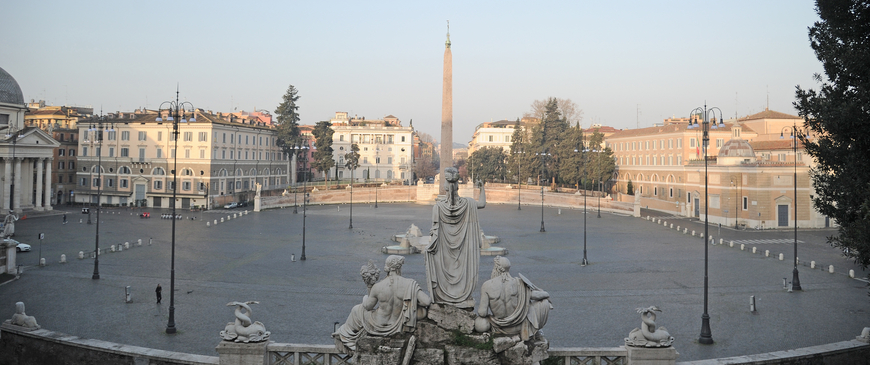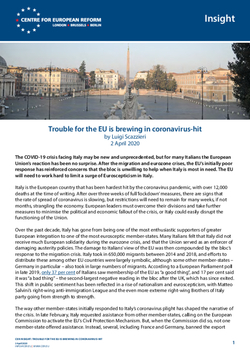
Trouble for the EU is brewing in coronavirus-hit Italy
The COVID-19 crisis facing Italy may be new and unprecedented, but for many Italians the European Union’s reaction has been no surprise. After the migration and eurozone crises, the EU’s initially poor response has reinforced concerns that the bloc is unwilling to help when Italy is most in need. The EU will need to work hard to limit a surge of Euroscepticism in Italy.
Italy is the European country that has been hardest hit by the coronavirus pandemic, with over 12,000 deaths at the time of writing. After over three weeks of full ‘lockdown’ measures, there are signs that the rate of spread of coronavirus is slowing, but restrictions will need to remain for many weeks, if not months, strangling the economy. European leaders must overcome their divisions and take further measures to minimise the political and economic fallout of the crisis, or Italy could easily disrupt the functioning of the Union.
The EU’s poor initial response has added to Italians’ concerns that the bloc is unwilling to help when Italy when it needs it most.
Over the past decade, Italy has gone from being one of the most enthusiastic supporters of greater European integration to one of the most eurosceptic member-states. Many Italians felt that Italy did not receive much European solidarity during the eurozone crisis, and that the Union served as an enforcer of damaging austerity policies. The damage to Italians’ view of the EU was then compounded by the bloc’s response to the migration crisis. Italy took in 650,000 migrants between 2014 and 2018, and efforts to distribute these among other EU countries were largely symbolic, although some other member-states –Germany in particular –also took in large numbers of migrants. According to a European Parliament poll in late 2019, only 37 per cent of Italians saw membership of the EU as “a good thing”, and 17 per cent said it was “a bad thing” – the second-largest negative reading in the bloc after the UK, which has since exited. This shift in public sentiment has been reflected in a rise of nationalism and euroscepticism, with Matteo Salvini’s right-wing anti-immigration League and the even more extreme right-wing Brothers of Italy party going from strength to strength.
The way other member-states initially responded to Italy’s coronavirus plight has shaped the narrative of the crisis. In late February, Italy requested assistance from other member-states, calling on the European Commission to activate the EU’s Civil Protection Mechanism. But, when the Commission did so, not one member-state offered assistance. Instead, several, including France and Germany, banned the export of essential medical equipment for fear that they would need it themselves. To make matters worse, European Central Bank (ECB) President Christine Lagarde said the ECB was “not here to close spreads” between the borrowing costs of member-states, leading to a sharp rise in Italian bond yields. Italy’s prime minister, Giuseppe Conte, criticised the central bank, saying its job should be to help rather than hinder the creation of measures to combat the coronavirus crisis.
The lack of immediate European solidarity with Rome was compounded by the fact that at the same time, Russia, China and even Cuba were sending medical equipment or teams of doctors to assist.
The lack of immediate European solidarity with Rome was compounded by the fact that at the same time, Russia, China and even Cuba were sending medical equipment or teams of doctors to assist Italy. Russia even sent soldiers from the radiation, chemical and biological defence department of its army. Russian vehicles with flags billowing in the wind drove from Rome to Italy’s hardest hit Lombardy region. Even though these public relations moves were clearly motivated by self-interest, eurosceptic politicians were quick to praise them, largely to make the point that this proved European solidarity was a myth. There is some evidence that many Italians agree with this view. One opinion poll in late-March suggested that 72 per cent thought the EU had not contributed “at all” to addressing the pandemic, and trust in the EU had slumped to 25 per cent from 34 per cent before the pandemic struck.
European institutions have subsequently done much to improve their response. The ECB took action to combat the economic impact of the coronavirus by launching a €750 billion Pandemic Emergency Purchase Programme, which can be used to buy Italian government bonds. And Lagarde made amends for her initial gaffe on spreads by saying the central bank was fully committed to avoiding any fragmentation in a difficult moment for the euro area. The Commission has succeeded in getting member-states to lift bans on the export of medical equipment, and also suspended its rules on budget deficit limits and state aid. This should allow governments to spend as much as they need to prop up their economies in the face of the emergency. And many member-states are now generously providing Italy with essential medical supplies, as well as treating Italian patients in their hospitals.
The EU has so far also failed to communicate its good deeds to the Italian public.
Nevertheless, the risk is that much damage has already been done to the EU’s reputation in Italy, as initial perceptions will not be easy to shift. The EU has so far also failed to communicate its good deeds to the Italian public. This has given eurosceptic politicians free rein to push the narrative that in Italy’s hour of need, the EU and its member-states turned their backs while faraway countries like Russia and China came to help. Their narrative will be strengthened if divisions between European countries deepen in the next phase of the crisis, as seems likely. Member-states are at odds over what to do next. While ECB bond purchases will keep Italian borrowing costs low, there are questions over whether they provide Italy and other highly-indebted countries with enough leeway to enact the emergency spending they need to support otherwise healthy companies and workers who lose their jobs.
A group of states led by France, Italy and Spain, argue that emergency spending to counter the outbreak should be financed jointly with so-called coronabonds. However, the idea of jointly issuing debt is sharply opposed by Germany, Austria and the Netherlands, who fear it would lead to moral hazard by weakening fiscal discipline in the future, and argue that member-states in need of assistance should use the European Stability Mechanism (ESM) instead. But this option is anathema to countries like Italy, as making use of ESM assistance comes with strings attached. The debate has often been toxic: for example, Dutch Finance Minister Wopke Hoekstra implied that countries like Germany and the Netherlands were better prepared to counter the economic impact of the pandemic because they had been fiscally responsible in the years prior to the crisis. His remarks prompted sharp rebukes from southern European politicians.
Criticism of the European approach to the coronavirus crisis is not only coming from eurosceptics. Pro-European Italians have also been critical of other member-states’ apparent inability to grasp the extraordinary and urgent nature of the crisis and respond accordingly. President Sergio Mattarella, who very rarely intervenes in political disputes, has issued several statements critical of the lack of willingness to help Italy, saying that solidarity was in the interests of all member-states. And European Parliament President David Sassoli said that the “short-sightedness and egoism of some governments” needed to be countered.
The way in which EU member-states respond after the worst of the crisis has passed will also be very important. Italian GDP will have shrunk significantly as a result of prolonged lockdown measures, and Italy will have had to take on significant amounts of new debt to try to mitigate their economic impact. This means that the country’s debt-to-GDP ratio is likely to balloon to above 150 per cent, from the current 135 per cent. Italy’s economy will struggle to return to growth if the government does not have the fiscal leeway to kick-start it, and financial markets will also have doubts about whether Italian debt at such high levels is sustainable. Italy will need a combination of EU-wide schemes to boost economic growth, and ECB support to keep debt financing costs very low.
The alternative scenario, one where Italy is left to its own devices and eventually defaults on its debt, will probably be averted, as it would be too damaging to the euro and the other member-states. The real risk is that European leaders do just enough to keep Italy solvent, but not enough to generate a substantial economic recovery or change its current political trajectory. The whole of the Italian political spectrum has already shifted in a more eurosceptic direction. When elections are next held in 2023, Italians might elect a EU-phobic government led by Salvini, perhaps in alliance with Brothers of Italy. Leaving the euro would become more likely, and even leaving the EU would be a possibility.
But even a moderate government in Rome would be likely to take on a much more eurosceptic hue. That would make it harder for the EU’s member-states to find a consensus on how to tackle the challenges facing the Union, from stabilising its neighbourhood to fighting climate change, managing migration and regulating new technology. In foreign policy, Rome would probably seek closer relations with China and Russia, making it much more difficult for the EU to formulate a coherent policy towards them.
It is in the interest of all member-states to act decisively to reverse the anti-EU narrative that is taking hold in Italy.
It is in the interest of all member-states to act decisively to reverse the anti-EU narrative that is taking hold in Italy. European leaders should launch an ambitious programme to jointly counter the economic effects of lockdowns, and do more to help member-states’ health systems cope with the outbreak. This will allow pro-European Italian politicians to counter eurosceptics’ arguments effectively. Communication is also important: European leaders should measure the words they use, and be mindful that it is easy to do damage and provide ammunition for eurosceptics. The EU itself also needs to be much better at communicating what it is doing, showing Italians that it is contributing to Italy’s efforts to counter the pandemic, and not standing in their way. The EU should focus on simple messages that convey what it has done to help Italy, avoiding technical terms. Simple infographics posted on social media platforms will be more effective than video clips of EU leaders whom Italians hardly know or like. Finally, European leaders need a plan to stimulate a V-shaped recovery when lockdowns are lifted to help ensure that Italy’s debt remains sustainable. Delay would be devastating for the Union.
Luigi Scazzieri is a research fellow at the Centre for European Reform.




Comments
Add new comment